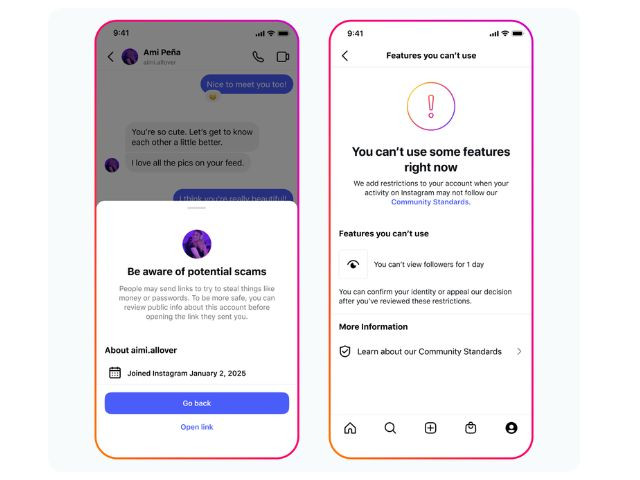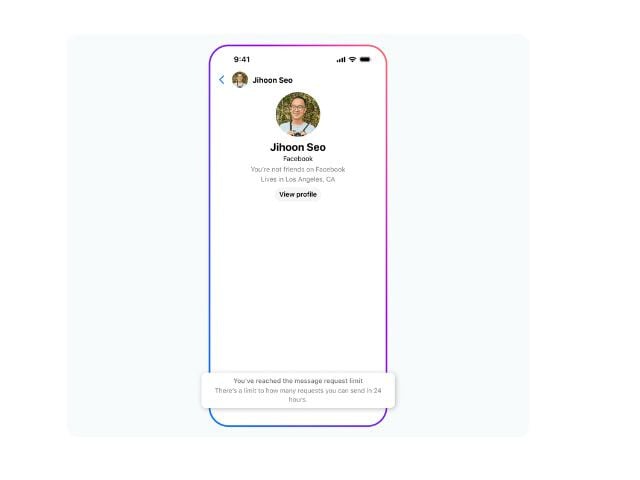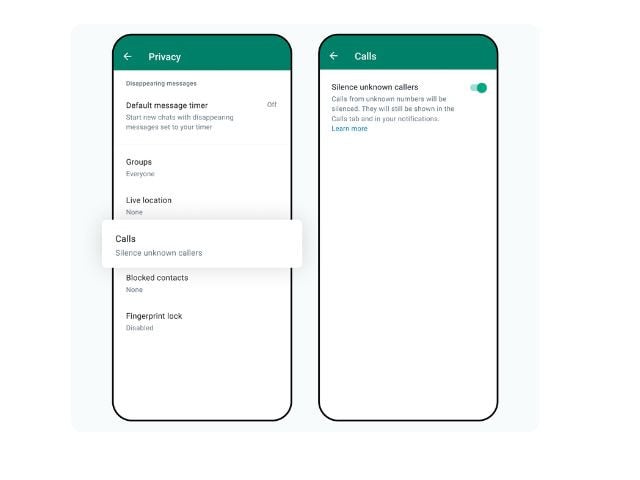
Meta is stepping up its efforts to protect users from online romance scams as Valentine’s Day approaches, a time when such frauds tend to increase.
With millions of people turning to dating apps, social media, and messaging platforms to connect, scammers are quick to exploit the holiday to deceive individuals looking for love.
Meta, which owns Facebook, Instagram, and WhatsApp, has announced a series of new tools and safety measures aimed at preventing users from falling victim to these scams.
As part of its global anti-scam campaign, Meta has released fresh research on romance scams and highlighted its role in the ongoing fight against online fraud.
New Tools to Detect and Prevent Scams
In an effort to protect users, Meta has enhanced its detection systems, which already remove millions of malicious accounts. The company has now rolled out additional safety features across its platforms, including Facebook Messenger, WhatsApp, and Instagram.

Photo: META
On Messenger, users will receive Safety Notices if they are engaging with an account that displays suspicious activity, such as signs of impersonation or contact from a different country. This tool is designed to help users exercise caution and think twice before interacting with potentially harmful accounts.

Photo: META
WhatsApp has introduced the ability for users to silence calls from unknown callers, preventing unwanted contact from scammers. This update helps shield users from fraudsters who may try to deceive them through unsolicited messages or calls.

Photo: META
Combatting Impersonation Scams
One of the most common types of romance scams involves impersonation. Scammers often pose as military personnel or celebrities to gain the trust of their targets.
Meta has disrupted several major scams where fraudsters pretended to be US military members or famous figures, using platforms like Facebook, Instagram, and TikTok to reach their victims.
These scammers typically initiate conversations by claiming to be lonely and looking for love, only to later ask for money to cover supposed expenses such as travel or romantic gifts.
Meta’s teams have worked with open-source researchers at Graphika to identify and take down these fake accounts. They have also blocked websites associated with these scams and removed fake profiles that were masquerading as well-known personalities or military personnel.
Tackling Fake Matchmaking Agencies
Another troubling form of scam involves fake dating agencies. Scammers posing as matchmaking companies target individuals on platforms like Facebook, Instagram, WhatsApp, and Telegram.
These fraudsters promise users the chance to meet wealthy or attractive individuals, often from foreign countries, and charge fees for access to potential matches. Meta has taken action to disrupt these operations, particularly targeting scammers from Kenya who were exploiting individuals in Africa.
Collaboration and Education
Meta’s anti-scam efforts also extend beyond its platforms. The company is working with law enforcement agencies and industry peers through the Tech Against Scams Coalition to share knowledge, discuss emerging threats, and improve detection methods.
Meta has also partnered with safety experts and created educational content to raise awareness about online scams. In Japan, for example, in-app tips have been shared with users to help them identify and report romance scams.
In addition to these proactive measures, Meta is also partnering with non-governmental organisations like Childhelp in the United States to educate young people about online safety. Through these efforts, Meta aims to reach users worldwide and equip them with the knowledge they need to avoid becoming victims of scams.
Meta’s Commitment to Safety
As part of its broader efforts to fight online fraud, Meta has removed over 400,000 scam accounts in the past year, primarily from countries like Nigeria, Ghana, and Cameroon.
The company is also testing facial recognition technology to further combat impersonation scams. If a suspicious account’s profile picture matches a public figure’s image, Meta’s systems will flag and remove the account.
Meta’s work is not limited to Valentine’s Day. The company continues to monitor and respond to emerging scam trends year-round, with the goal of protecting users from fraud. Meta’s proactive approach, combined with increased user education and improved safety tools, aims to make its platforms safer for everyone.
As scammers continue to take advantage of holidays like Valentine’s Day, Meta urges users to stay vigilant, question unsolicited messages, and report any suspicious activity to help keep the online community safe.


1727426214-0/Tribune-Pic-(7)1727426214-0-165x106.webp)






1736506325-0/Untitled-design-(7)1736506325-0-270x192.webp)
















COMMENTS
Comments are moderated and generally will be posted if they are on-topic and not abusive.
For more information, please see our Comments FAQ